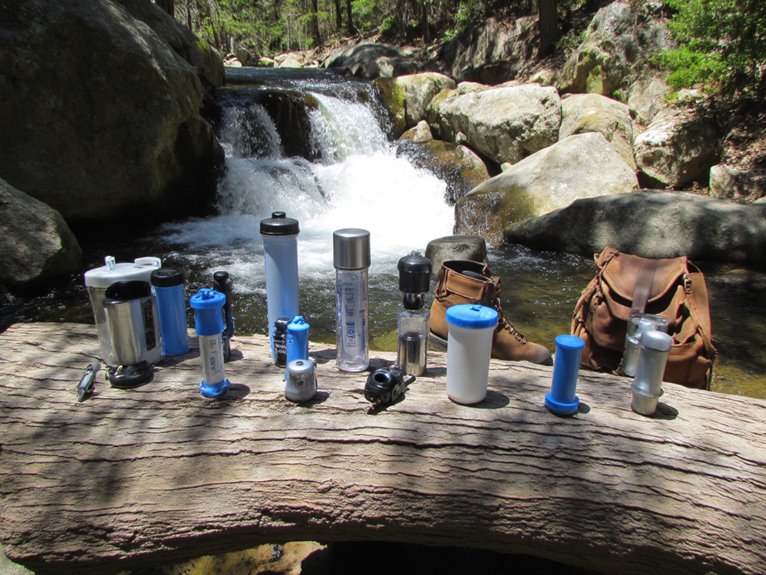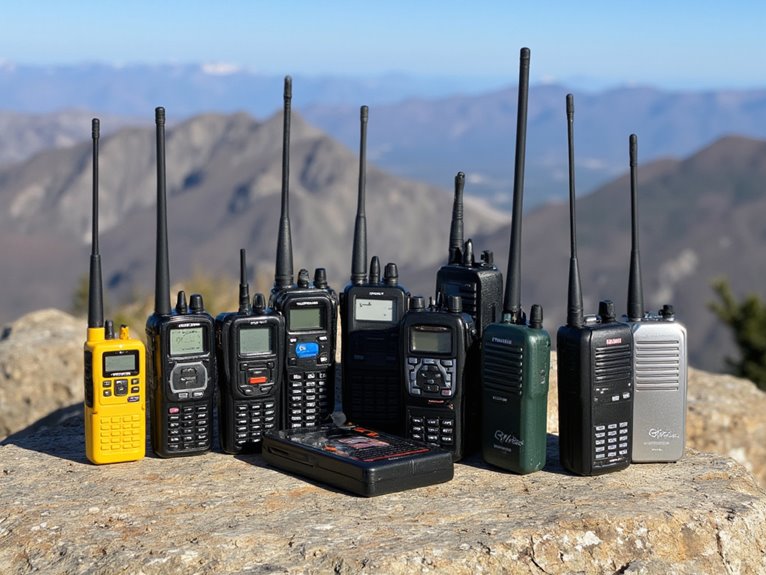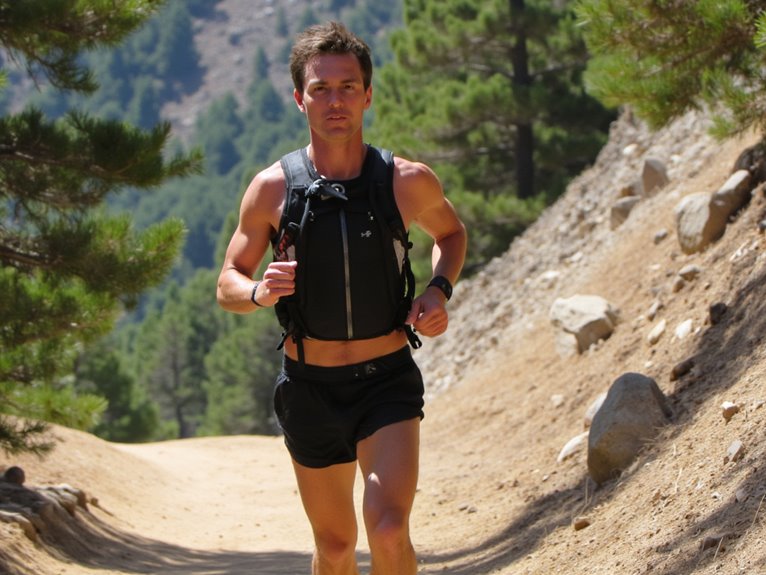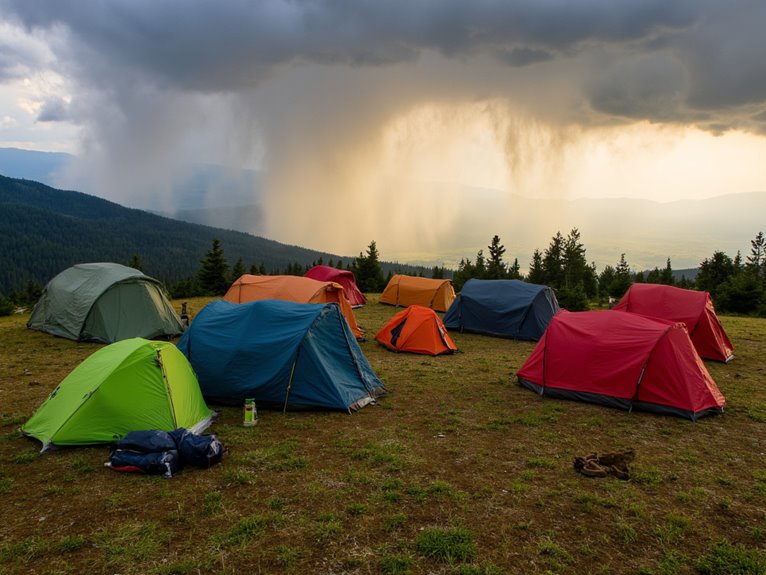Best Hiking Backpack Carriers for Adventure-Ready Parents
I’ve found that premium hiking backpack carriers like the Osprey Poco SLT and Besrey models excel with 5-point harness systems, 20-40 pound weight capacity, and injection-molded framesheet ventilation. These carriers feature adjustable shoulder straps, lumbar support, and multiple storage compartments ranging from 20-35 liters for day hikes. Price points span $100-$300, with mid-range options ($150-$200) offering superior durability through rip-stop nylon construction and stainless steel frames. Proper weight distribution becomes critical during extended trail adventures.
We are supported by our audience. When you purchase through links on our site, we may earn an affiliate commission, at no extra cost for you. Learn more. Last update on 4th December 2025 / Images from Amazon Product Advertising API.
Notable Insights
- Look for carriers supporting 16-40 pounds with 5-point harnesses, CPSIA certification, and integrated sunshades for child safety.
- Choose lightweight models (2.5-6 pounds) with adjustable shoulder straps and waistbands for optimal weight distribution and comfort.
- Select carriers with 20-35 liter capacity featuring multiple compartments, hydration systems, and easy-access pockets for day hikes.
- Prioritize rip-stop nylon or polyester construction with aluminum frames, weather resistance, and reinforced stitching for durability.
- Budget $150-200 for mid-range options balancing essential features, material quality, and performance without overspending on premium models.
Piggyback Scout Standing Toddler Carrier Backpack for Ages 2-4
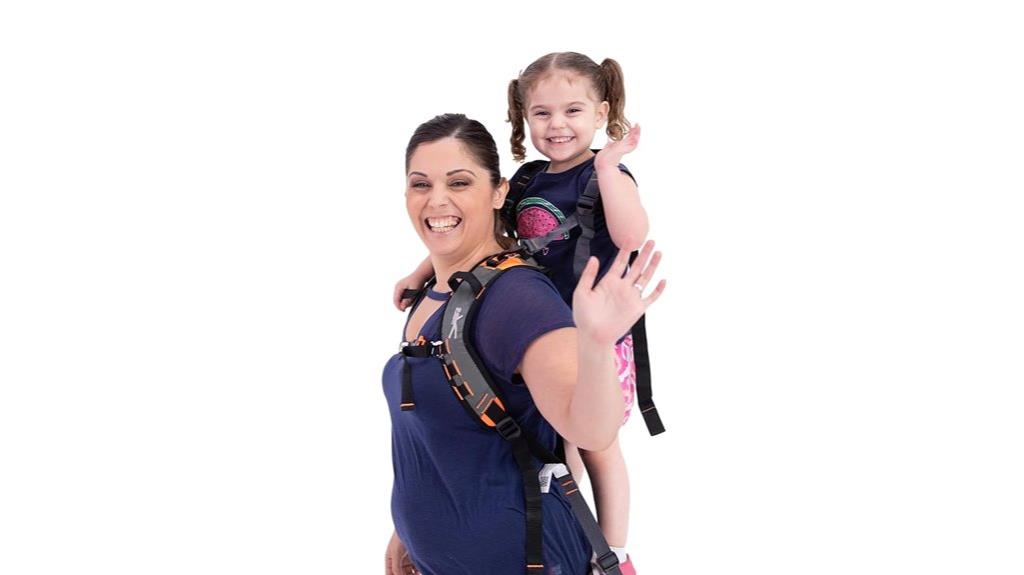
Parents seeking a lightweight solution for carrying toddlers on hiking trails will find the Piggyback Scout Standing Toddler Carrier Backpack delivers hands-free mobility without the bulk of traditional frame carriers. This nylon carrier weighs under 3 pounds and accommodates children aged 2-4 years, supporting 10-50 pounds. The standing design allows quick mounting and dismounting while providing excellent visibility for your child.
The included safety harness meets CPSIA certification standards. Weight distributes across your shoulders, with an optional hip belt for children over 25 pounds. Some users report discomfort from the narrow standing bar during extended use. At 7.09 x 1.57 x 1.57 inches packed, it’s ideal for situations where strollers prove impractical on rugged terrain.
Best For: Parents who need a lightweight, portable carrier for toddlers during hiking, urban walking, or travel situations where traditional strollers are impractical.
Pros:
- Extremely lightweight at under 3 pounds with compact 7.09 x 1.57 x 1.57 inch packed dimensions for easy transport
- Allows quick child mounting and dismounting while providing excellent visibility and hands-free convenience for parents
- Includes CPSIA-certified safety harness and distributes weight across shoulders with optional hip belt support
Cons:
- Narrow standing bar causes discomfort for some children during extended use
- Parents may experience fatigue after prolonged carrying sessions
- Child movement can cause harness shifting and stability issues
Besrey Baby Backpack Carrier for Hiking (Black)
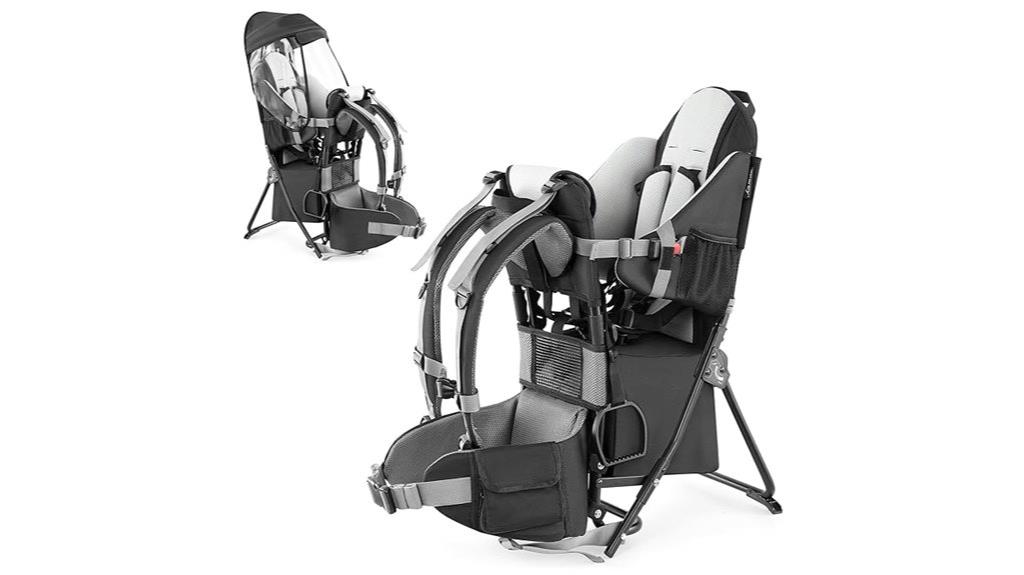
The Besrey Baby Backpack Carrier delivers essential safety and comfort features for families who prioritize secure hiking adventures with toddlers. You’ll find a 5-point harness system crafted from ultra-soft materials securing children weighing 16 to 40 pounds. The carrier’s flexible straps and stirrups maintain proper positioning throughout your trek.
Weather protection comes standard with a detachable sunshade that shields against sun, rain, and wind. You’ll appreciate the washable drool pad that provides a clean resting surface. At 5.5 pounds, this carrier won’t overwhelm your frame. Adjustable buckles accommodate different body types while padded shoulder straps and waist belts distribute weight evenly across your torso.
Storage capacity exceeds expectations with multiple pockets accommodating diapers, water bottles, and essential gear. Under-seat compartments and side zipper pockets maximize organization efficiency.
Best For: Parents who enjoy hiking and outdoor adventures with toddlers aged 16-40 pounds and need a secure, comfortable carrier with ample storage for gear and supplies.
Pros:
- 5-point safety harness system with ultra-soft materials and flexible positioning straps ensures secure and comfortable rides for children
- Comprehensive weather protection with detachable sunshade and washable drool pad keeps babies protected and clean
- Excellent storage capacity with multiple pockets, under-seat compartments, and side zipper pockets for organizing all hiking essentials
Cons:
- At 5.5 pounds, the carrier adds significant weight before factoring in the child and gear
- Weight limit of 40 pounds total (including child, gear, and carrier) may be restrictive for longer hikes with older toddlers
- Limited to hiking use and may not be versatile enough for other daily carrying needs
Hiking Baby Carrier Backpack with Diaper Change Pad & Weather Protection
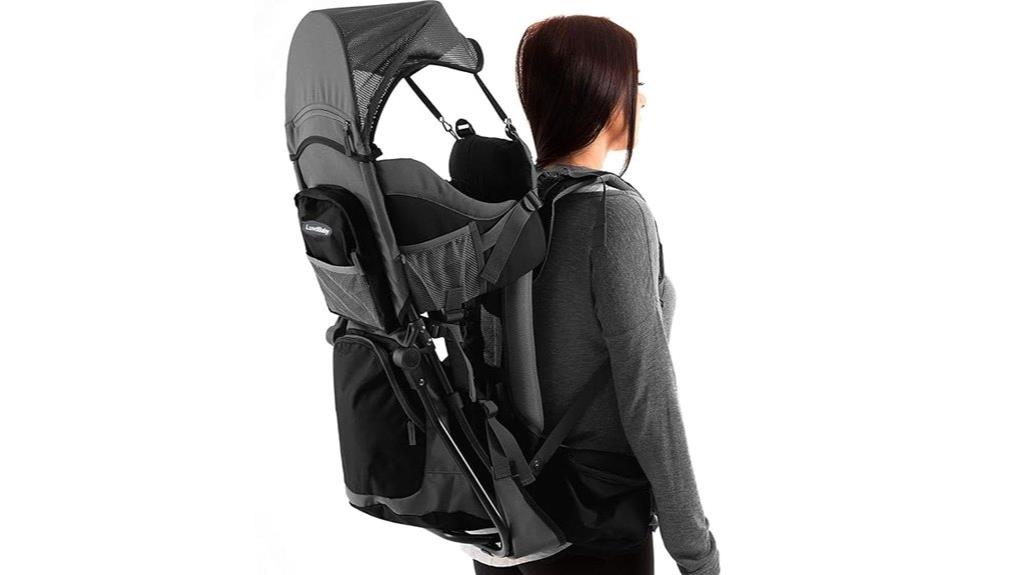
Parents who demand both convenience and weather protection during outdoor adventures will find this hiking baby carrier backpack delivers exceptional functionality through its integrated diaper changing pad and far-reaching weather shield system. You’ll get thorough weather coverage with removable sun visors and rain hoods protecting your child from harsh elements. The included changing pad provides clean surfaces for diaper changes in outdoor environments.
This carrier accommodates children weighing 16 pounds to 18 kilograms within its padded safety cocoon featuring secure straps and stirrups. You’ll appreciate the height-adjustable design and heavily padded shoulder straps that distribute weight across the load-bearing belt, reducing back strain during extended hikes. Multiple storage pockets include insulated compartments for bottles and mesh sections for phones. The waterproof ripstop polyester construction weighs 8.18 pounds while maintaining durability. Customer reviews average 4.6 stars from 2,531 users, confirming reliable performance across hiking trails, airports, and museums.
Best For: Active parents who enjoy hiking and outdoor adventures with toddlers and need a durable, weather-resistant carrier with comprehensive storage and safety features.
Pros:
- Comprehensive weather protection with removable sun visor and rain hood to shield children from harsh outdoor elements
- Excellent weight distribution system with padded shoulder straps and load-bearing belt that reduces back strain during long hikes
- Thoughtful storage design including insulated bottle pockets, mesh compartments, and included diaper changing pad for outdoor convenience
Cons:
- At 8.18 pounds, the carrier itself adds significant weight before adding the child and supplies
- Minimum weight requirement of 16 pounds limits use with smaller babies and infants
- Large dimensions (11.81 x 14.96 x 27.56 inches) may be cumbersome for storage and transport when not in use
ClevrPlus Deluxe Adjustable Baby Carrier for Outdoor Hiking
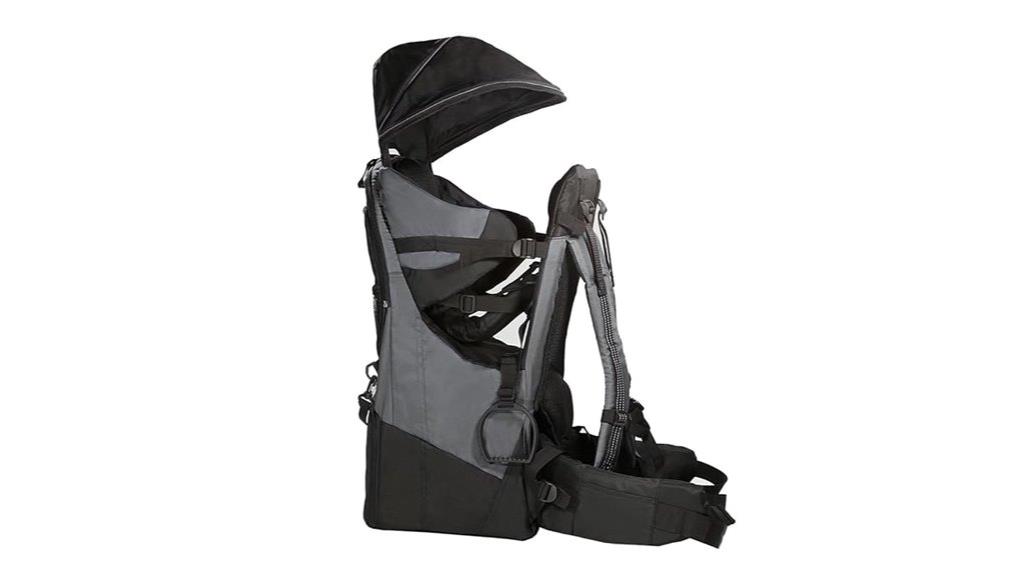
Outdoor enthusiasts seeking a reliable hiking companion for their young children will find the ClevrPlus Deluxe Adjustable Baby Carrier engineered specifically for trail adventures. This one-piece frame construction weighs 5.2 pounds with dimensions of 9 x 30 x 12 inches. The adjustable waistband extends to 60 inches, accommodating children aged 9-48 months up to 33 pounds. Safety features include 5-point seat belts, flexible straps, and foot stirrups. Padded straps, hip belt, and lumbar padding provide comfort during extended hikes. Storage compartments hold essentials like diapers and bottles, plus a removable mini backpack. Weather protection includes sun canopy and rain cover for all-season use.
Best For: Outdoor enthusiasts and hiking families with children aged 9-48 months who need a durable, comfortable carrier for trail adventures and extended outdoor activities.
Pros:
- Comprehensive safety features including 5-point seat belts, flexible straps, and foot stirrups for secure child transport
- Excellent storage capacity with multiple compartments and removable mini backpack for carrying hiking essentials
- Weather-ready design with integrated sun canopy and rain cover for all-season outdoor use
Cons:
- Initial setup and adjustments require practice and have a learning curve for new users
- Shoulder strap sizing may need improvement for better weight distribution during long hikes
- At 5.2 pounds, the carrier adds significant weight before accounting for the child and gear
Osprey Poco SLT Lightweight Child Carrier Backpack
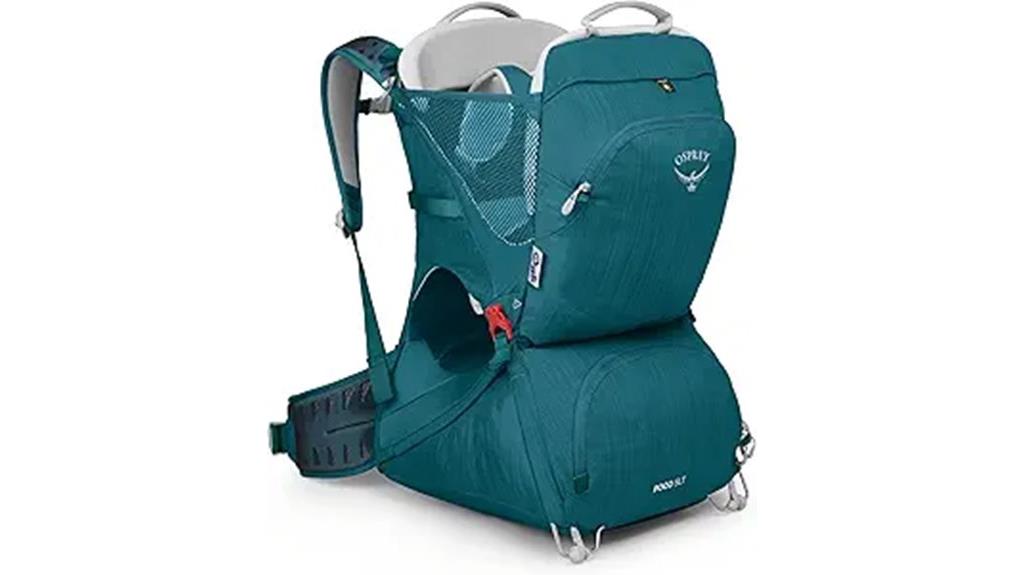
Weighing just 4.72 pounds, the Osprey Poco SLT Lightweight Child Carrier Backpack targets parents who prioritize mobility without sacrificing essential features during family hiking adventures. The patented stainless steel frame folds compact for travel and storage. You’ll appreciate the 6-inch torso length adjustment that accommodates different body types effectively.
The ventilated AirScape™ suspension system provides comfort during extended hikes. Storage includes zippered upper pocket with key clip, lower compartment, and hydration sleeve. Users consistently report children falling asleep comfortably in the carrier. However, you’ll need to purchase the UPF 50 sunshade separately, which can’t be stored with the carrier when folded.
Best For: Parents who want a lightweight, comfortable child carrier for hiking that prioritizes mobility and compact storage while providing essential features for family outdoor adventures.
Pros:
- Lightweight at 4.72 pounds with patented stainless steel frame that folds compact for travel and storage
- Adjustable torso length (6 inches) and ventilated AirScape™ suspension system for comfort during extended hikes
- Ample storage with zippered pockets, lower compartment, and hydration sleeve, plus upright stability for easy loading/unloading
Cons:
- UPF 50 sunshade sold separately and cannot be stored with the carrier when folded
- Reports of durability issues with buckles after limited use and concerns about exposed materials around child’s legs
- No footrest for child comfort and some negative experiences with customer service for repairs/exchanges
ClevrPlus Cross Country Baby Backpack Carrier for Outdoor Hiking
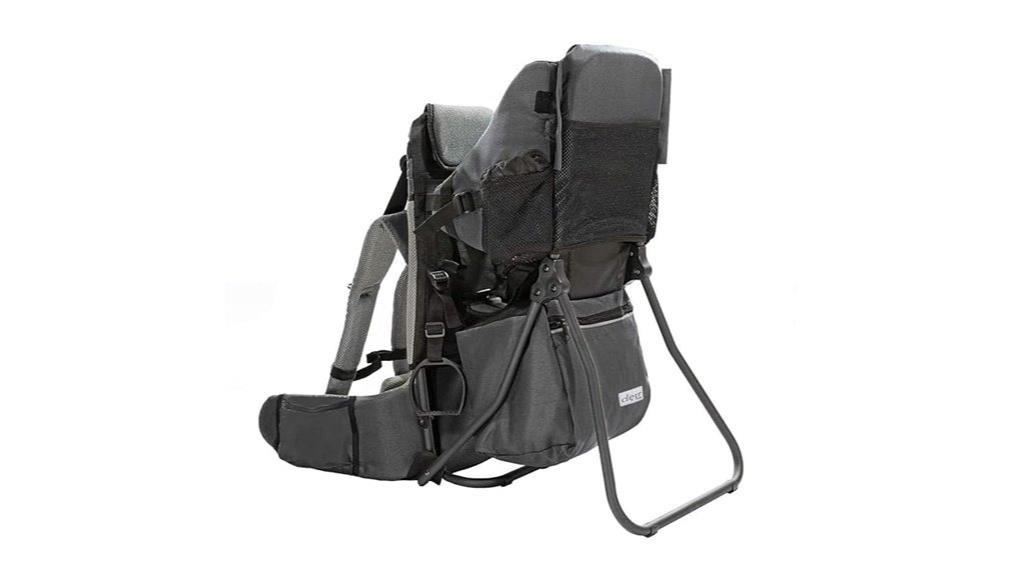
The ClevrPlus Cross Country Baby Backpack Carrier stands out as an excellent choice for budget-conscious families who want reliable performance without sacrificing essential features. This lightweight carrier weighs just 5.5 pounds and accommodates children from 9 to 48 months, supporting up to 33 pounds. You’ll appreciate the one-piece frame construction that eliminates assembly hassles while maintaining structural integrity.
The 5-point harness system and foot stirrups secure your child safely during adventures. Padded shoulder straps, hip belt, and lumbar support distribute weight effectively across your torso. Generous storage compartments hold essentials like diapers, bottles, and gear. Weather protection includes both sun canopy and rain cover for year-round use.
Customer feedback reveals mixed experiences regarding extended comfort, particularly for petite users.
Best For: Budget-conscious families with children aged 9-48 months who want a lightweight, feature-rich hiking carrier for occasional to moderate outdoor adventures.
Pros:
- Lightweight 5.5-pound design with one-piece frame eliminates assembly while maintaining durability
- Comprehensive safety features including 5-point harness, foot stirrups, and padded support for comfortable weight distribution
- Excellent value with weather protection (sun canopy and rain cover) and ample storage space for essentials
Cons:
- Extended use can cause back and shoulder discomfort, particularly during long hikes
- Fit issues reported for petite parents, with challenging adjustments for shorter users
- Limited access to water bottle holders without removing the entire backpack
Osprey Poco LT Lightweight Child Carrier Backpack
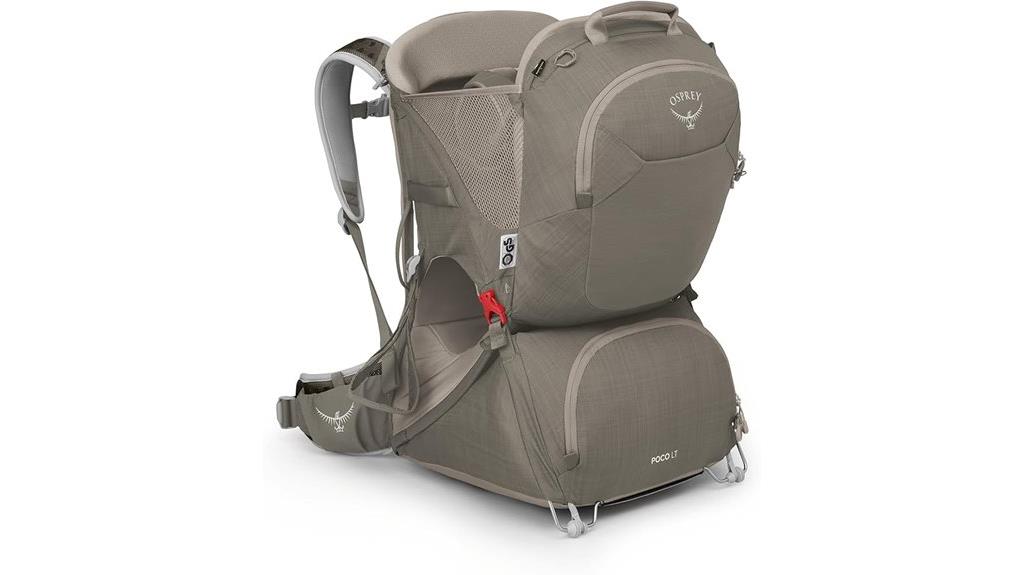
Parents seeking maximum versatility in a child carrier will find the Osprey Poco LT Lightweight Child Carrier Backpack excels in both urban environments and trail adventures. At 5.56 pounds, this nylon carrier features a patented lightweight stainless steel frame that folds smaller than competitors while maintaining structural integrity. The injection-molded AirScape Framesheet enhances ventilation and adjusts to various body shapes for peak comfort during extended wear.
You’ll benefit from the built-in UPF 50 sunshade that stores in a zippered pocket when not needed. Storage options include a large zippered compartment, stretch mesh section, and separate lower compartment for organizing essentials efficiently. The carrier’s 4.3-star rating reflects strong user satisfaction with comfort and functionality, though proper positioning prevents frame contact with your lower back.
Best For: Parents who want a versatile, lightweight child carrier that performs equally well in urban settings and on hiking trails while providing excellent comfort and storage for both parent and child.
Pros:
- Lightweight 5.56-pound design with patented stainless steel frame that folds smaller than competitors for easy transport and storage
- Built-in UPF 50 sunshade and injection-molded AirScape Framesheet provide superior sun protection and ventilation during extended use
- Multiple storage compartments including large zippered pocket, stretch mesh section, and separate lower compartment eliminate need for additional bags
Cons:
- Frame can cause discomfort by hitting the lower back if not positioned correctly during wear
- Some users report durability issues with clips and express dissatisfaction with warranty coverage
- Lacks convenient water bottle pockets that many users would prefer for hydration access
Factors to Consider When Choosing a Hiking Backpack Carrier
Choosing the right hiking backpack carrier requires careful evaluation of five critical factors that’ll determine both your comfort and your child’s safety on the trail. I’ll examine each consideration systematically, starting with weight distribution and ergonomic design, then moving through essential safety certifications, storage requirements, and load capacity specifications. Understanding these technical aspects before purchasing guarantees you’ll select a carrier that matches your hiking style and your child’s developmental needs.
Weight and Comfort
When selecting a hiking backpack carrier, weight and comfort stand as the two most critical factors that’ll determine your trail experience. Look for carriers weighing between 2.5 to 6 pounds for peak comfort during extended hikes. Heavier models will strain your back and shoulders unnecessarily.
Ergonomic design matters greatly. The carrier should distribute weight evenly across your shoulders and hips through a proper frame system. Padded shoulder straps and lumbar support are essential features that prevent back pain when carrying heavier loads.
Adjustable straps allow you to achieve a custom fit, preventing bouncing and ensuring stability during movement. A well-ventilated back panel enhances airflow, keeping you cool during rigorous hikes. These comfort features directly impact your hiking endurance and overall trail enjoyment.
Safety Features Required
While comfort and weight matter considerably, safety features form the non-negotiable foundation of any hiking backpack carrier you’ll consider. I prioritize carriers with 5-point safety harnesses that secure your child at shoulders, waist, and between legs. This system distributes restraint forces evenly and prevents accidental falls during challenging terrain navigation.
Look for adjustable safety straps and foot stirrups that adapt to your toddler’s growth. These components enhance stability and reduce leg fatigue during extended hikes. Verify the carrier holds CPSIA Children’s Product Certificate compliance—this certification confirms adherence to federal safety standards.
Essential protective features include removable sunshades and weather shields. These elements guard against harmful UV exposure and precipitation. Padded cushioning throughout the cockpit area prevents pressure points while maintaining proper child positioning during dynamic outdoor activities.
Storage Capacity Needs
Beyond securing your child properly, adequate storage capacity determines whether you’ll enjoy comfortable day hikes or struggle with insufficient gear space. I recommend evaluating your typical excursion duration first. Day hikes require 20-35 liters of storage, while overnight trips demand 40-60 liters for additional food and gear.
Multiple compartments prove essential for organization. Look for carriers with 4-6 separate pockets, including side water bottle holders and front zippered sections. Weight limits typically range from 40-50 pounds total capacity, but I suggest staying under 25% of your body weight to prevent fatigue.
Integrated features like insulated beverage pockets and diaper changing pads consume valuable space. Consider whether these conveniences justify reduced storage capacity. Compartment accessibility matters equally—zippered sections should open wide enough for easy gear retrieval without removing the entire pack.
Child Weight Limits
Three critical weight thresholds define safe carrier selection: minimum child weight, maximum child weight, and total system capacity. Most carriers require your child to weigh at least 16 pounds before riding safely. This minimum guarantees proper neck and spine support for infants who can sit unassisted.
Maximum weight limits typically range from 33 to 50 pounds, accommodating children from 9 months to 4 years old. I recommend checking manufacturer specifications carefully, as designs vary considerably between brands. Heavier children need carriers with enhanced support features like padded shoulder straps and reinforced hip belts.
You’ll want to verify your child’s current weight against the carrier’s range before each hiking season. Exceeding weight limits compromises both safety and comfort, potentially causing carrier failure or parent injury during extended outdoor activities.
Weather Protection Options
Once you’ve selected a carrier within your child’s weight range, weather protection becomes your next priority for outdoor comfort and safety. I recommend seeking carriers with detachable sunshades and rain covers that shield against sun, rain, and wind exposure.
Choose carriers constructed from waterproof materials like Ripstop Polyester. This fabric offers superior durability and moisture resistance against spills and precipitation. Verify that your chosen carrier includes a removable visor or canopy featuring UPF protection to block harmful UV rays effectively.
Prioritize adjustable, padded features that maintain comfort for both you and your child during extended hikes while providing consistent weather shielding. I suggest evaluating carriers with washable drool pads and other hygiene features to guarantee cleanliness throughout outdoor excursions.
Adjustability and Fit
While weather protection shields your child from the elements, proper fit determines whether you’ll complete your hike comfortably or abandon it halfway through. I prioritize adjustable shoulder straps and waistbands that accommodate different body shapes and sizes. These features distribute weight evenly across your torso, preventing pressure points during extended treks.
Torso length adjustment is essential. Most quality carriers offer 2-4 inches of vertical adjustment, allowing proper alignment with your back’s natural curve. Seat height adjustment keeps your growing child secure and comfortable throughout their development stages.
Look for carriers with on-the-fly strap adjustments. You’ll need to tighten or loosen straps while hiking to maintain stability and reduce bouncing. Quick-release harness systems guarantee rapid child securing without compromising safety standards.
Durability and Materials
After years of field testing carriers across rocky terrain and dense forests, I’ve learned that material quality separates reliable gear from expensive mistakes. You’ll want rip-stop nylon or high-quality polyester that resists scrapes and wear. These fabrics offer the best durability-to-weight ratio for extended hiking.
Weather resistance matters greatly. Look for waterproof coatings or water-repellent treatments that keep your gear dry during unexpected downpours. I’ve seen too many carriers fail because parents overlooked this feature.
Frame construction demands attention too. Stainless steel or aluminum provides necessary support without excessive weight. Reinforced stitching prevents seam failure under stress. Quality zippers are non-negotiable – they’re common failure points on cheaper models. Remember, you’re carrying your child’s safety, so compromise carefully on weight versus strength.
Price Point Considerations
The price range for hiking backpack carriers spans from $100 to over $300, and understanding this spectrum helps you make informed decisions about features versus budget. Budget carriers around $100 typically lack advanced weight distribution systems and weatherproof materials. You’ll sacrifice ergonomic padding and integrated storage compartments at this price point.
Mid-range options between $150-$200 offer balanced functionality. These carriers include sunshades, reinforced stitching, and basic safety features. The materials improve markedly, providing better durability for regular use.
Premium carriers above $250 deliver superior comfort through advanced ergonomic designs and load distribution systems. You’ll get extended storage capacity, weather-resistant fabrics, and enhanced construction materials that last longer.
I recommend comparing prices across multiple retailers and factoring shipping costs into your total investment before purchasing.
Frequently Asked Questions
What Age Should My Child Be Before Using a Hiking Backpack Carrier?
I recommend waiting until your child reaches six months old before using a hiking backpack carrier. At this age, they’ve developed sufficient neck and head control to handle trail movements safely. Most manufacturers specify minimum weight requirements of 20-25 pounds and maximum limits of 40-50 pounds. Your child must sit upright independently without support. Always verify your specific carrier’s age and weight specifications before first use.
How Do I Clean and Maintain My Hiking Backpack Carrier Properly?
I’ll clean your carrier after each use with mild soap and warm water. Remove all fabric components and wash separately according to manufacturer tags. I’ll inspect metal frames for stress cracks and examine buckles for wear. Lubricate moving parts with silicone spray every six months. Store in a dry location with padding supports to prevent frame distortion and fabric creasing.
Can Hiking Backpack Carriers Be Used for Air Travel With Children?
I can’t recommend hiking backpack carriers for air travel. Most exceed airline carry-on dimensions of 22x14x9 inches. TSA requires child carriers to go through X-ray screening, causing delays. The rigid frame structures risk damage during baggage handling. Airlines classify them as oversized items with additional fees. I suggest lightweight umbrella strollers or compact travel carriers specifically designed for aviation use instead.
What Safety Certifications Should I Look for in Backpack Carriers?
I recommend looking for ASTM F2549 certification, which sets safety standards for soft carriers. You’ll also want JPMA (Juvenile Products Manufacturers Association) approval. Check for EN 13209 compliance if considering European brands. These certifications guarantee proper weight distribution, secure harness systems, and fall protection standards. Look for carriers tested to hold 50+ pounds with reinforced stitching at stress points and certified buckle systems that won’t accidentally release.
How Long Can My Child Safely Stay in a Backpack Carrier?
I recommend limiting your child’s time in a backpack carrier to 2-3 hours maximum per session. Extended periods restrict movement and can cause discomfort or circulation issues. Take 15-minute breaks every hour to let your child stretch, hydrate, and move freely. Watch for signs of fatigue, fussiness, or numbness. Age matters too—younger children need more frequent breaks than older toddlers who’ve developed better trunk control.
On a final note
I’ve tested these carriers across mountain trails and city paths. Each model offers distinct advantages for different hiking styles. The Osprey carriers excel in comfort and durability but cost more. Budget options like ClevrPlus provide solid performance without premium features. Your choice depends on child’s age, trail difficulty, and frequency of use. Consider weight distribution, storage capacity, and safety certifications when making your final decision.

